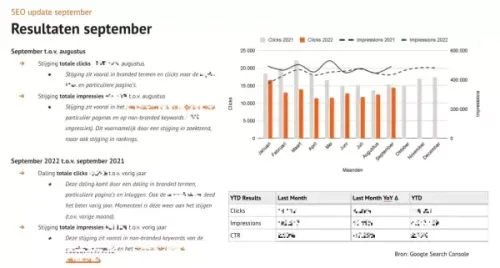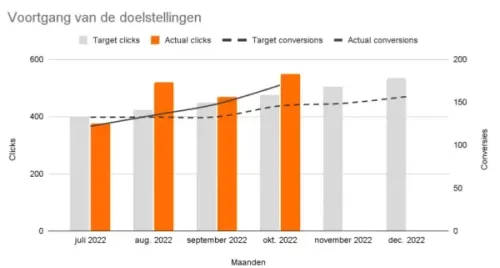A good SEO report is crucial for any organization involved in search engine optimization. In this blog post, we provide you with tips for creating a successful SEO report. With our free template, you can get started right away.
Why is an SEO report so important?
An SEO report keeps your SEO strategy top of mind with the management layer. If you want to get things done within the organization, communication is extremely important. By keeping stakeholders informed about the SEO strategy and the progress of activities, you create support with your manager and the rest of the organization. By demonstrating monthly what the SEO efforts yield, management gains a better understanding of the importance and ROI of investing in SEO.
Avoid these pitfalls when creating an SEO report
When reporting SEO results, KPIs are often used that are not relevant or clear to management. The reader or listener (when presenting) is shown meaningless metrics and irrelevant information. Think of endless spreadsheets with rankings of all keywords and metrics such as site health, broken links, redirects, number of crawled pages, and so on. What's going wrong here? The focus and priorities are missing.
What is often missing are clear conclusions and insights that can be derived from the presented data. Only the data itself is reported. Without mentioning how to interpret it and what causes lie behind the results. In many cases, no follow-up actions are determined based on the achieved results.
How this leads to even bigger issues
This creates confusion about how the SEO goals are actually being achieved. There is no visibility on progress. Moreover, there is a lack of insight into the causes of not achieving goals, leading to uncertainty about the next steps to take. All this can contribute to distrust in SEO and reduced support.
But how should it be done?
There are a few things that are extremely important when reporting on SEO results:
Tailor the SEO report to your audience and objectives
Think carefully about who you are creating the SEO report for. The management layer wants to know about the ROI, revenue from SEO, and the SEO market share. So think carefully about what information is interesting for this audience and what information is redundant. Also, ensure that the data aligns with the organization's objectives, such as non-branded traffic, conversions per business line, or the SEO market share. The report should focus on the main KPIs. Don't get too caught up in details and focus on what is important.
Communicate not only numbers but also conclusions
To effectively convey the message of your SEO report, it is important to communicate conclusions based on the data, in addition to numbers. As an SEO specialist, you are an expert in correctly interpreting SEO data. Your readers, such as the management layer or colleagues from other teams, generally have less knowledge of SEO.
Is there a growth in organic traffic? Take the reader or listener through the causes of this growth and help them understand the information. Why has traffic increased? Are there external influences, such as an increase in search volume? Is it branded or non-branded traffic? Are there directories or pages that have performed better? Or specific keywords? By sharing these kinds of conclusions and insights, you make the report interpretable and therefore more valuable.
Create attention for roadblocks
In addition to communicating the results, it is equally important to indicate roadblocks or problems so that your manager can take action. Be honest about this. It can sometimes be challenging to deliver bad news or address problems. But that transparency creates understanding, even when things are not going well. It will likely earn you a lot of appreciation because you are bringing an important issue to light. By showing where the bottlenecks are, your manager can help you with them. Think, for example, of scaling up capacity or budget.
Components of the SEO report:
Now that you know what is important when reporting on SEO results, we will take you through the different components of the ideal SEO report. Always include the following points:
- A summary of the main findings.
- A recap of the previously set annual goals and progress.
- A brief description of the activities of the past month.
- The SEO results of the past month
- Branded vs Non-branded traffic: split the results of branded and non-branded keywords. It is extremely important to distinguish these from each other and thus give much more meaning to developments in SEO traffic. Make both year-over-year (YoY) and month-over-month (MoM) comparisons for branded and non-branded clicks and impressions.
- Clusters/business lines: also report at the cluster level, which aligns with the business. Think, for example, of results per business line. This helps the organization better understand how the website's SEO performance relates to the business objectives.
- (Soft) conversions, orders, profit, and/or ROI: depending on the objectives, also report on what the SEO traffic actually delivers in terms of conversions. Or even better: money. If possible, also make a split per business line here.
- Successes that deserve extra attention: are there results that you want to highlight in the report? Think, for example, of an improvement in website performance, the position of an important keyword, the growth of the number of backlinks, or the reindexing of pages after a bug.
- Attention points and roadblocks: things that require extra attention, such as capacity issues, market developments.
- Next steps and the plan for the next month: here you show that you not only draw conclusions from the results but also actually initiate action to achieve the objectives.
- Attachments: information, tables, and charts that are too large or distracting to include in the previous sections.
Some examples from the SEO report
Example 1

Example 2

Conclusion
In an SEO report, it is important to present clear insights and conclusions in addition to the data. Ensure that you keep the amount of data limited so that the recipient does not get lost in a maze of numbers. Instead, spend extra time correctly interpreting the data and make clear which (internal and external) factors have contributed to the results.
Paying a lot of attention to a good SEO report is therefore essential. This way, management understands the SEO results, you keep important stakeholders in the loop of your SEO strategy, you create more support, and your manager has more tools to make decisions that help you achieve the SEO objectives. In short, you get more done and make faster progress.
Would you like to receive the free SEO report or have a question about search engine optimization? Feel free to contact us.




